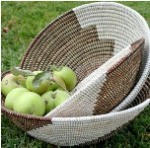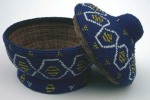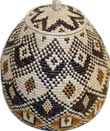
The other day I went to the museum of arts where I visited the Native American section, and realized that there was a strong difference between Native American baskets and African baskets. This is when I thought of discussing African baskets on my blog.

Well, first of all, you should know that African baskets are different from country to country. You will find out that West African baskets (Togo, Senegal, Ghana…) are different from Central African baskets (Cameroon, DRC, Burundi…), which are different from Southern African baskets (Zimbabwe, South Africa, etc…). This difference is mostly due to the fact that different ethnic groups inhabit those regions, like the bantus in the South, the Nilotes in the North, etc… plus our own experiences in life, and the climate give us different tools to make baskets.

For instance, in Cameroon (my country), baskets are made out of dried palm leaves, bark wood, or Raffia also known as African bamboo, in Rwanda they are made out of sisal fibers, banana leaves, or grass; in Senegal, njodax grass is used; while in South Africa, they are made out of llala palm leaves, sisal leaves, etc.

The styles and patterns on the baskets also vary from sub-regions on the African continent. Baskets are dyed with either natural plant pigments, bark, berries, leaves, clay, roots, dung, or tea leaves as well as with commercial dyes.

Weaving baskets is truly an art, and you can usually recognize which area and sometimes which country in Africa they are coming from.
The Handicraft Center in Dschang, Cameroon, has beautiful beaded baskets and other art work.
Please discover, and enjoy the art of making African baskets!


Quite a beautiful website. I recently built mine and i was looking for some ideas and you gave me a few. The website was developed by you?
Cheers
LikeLike
Thank you…. It was entirely developed by me on the WordPress platform who provided themes, space, etc.
LikeLike
Good blog post. I like your point of view and i want to thank you for interesting and helpful information. Thank you!
LikeLike
Pingback: Les petits metiers: le Vannier / Small Trades: the Basket-maker « African Heritage
online dating for women
Good day! I could have sworn I’ve been to this website before but after reading through some of the post I realized it’s new to me. Anyways, I’m definitely happy I found it and I’ll be book-marking and checking back often!
LikeLike
Those baskets look amazing. They certainly took a lot of effort to make. It’s also interesting knowing about which baskets came from which part of Africa.
LikeLike
yes. it is. the different weaving patterns and shapes, and also the type of material used will tell you this.
LikeLiked by 1 person
Definitely. I was really impressed with those basket pictures and it would be great to buy one of those from some of the local artisans or at the very least buy one that is sold at a fair trade shop.
LikeLike
yes indeed.
LikeLiked by 1 person
That would be very nice. I’m sure some places already do that. Although I do wish more fair trade shops would open closer to where I live.
LikeLike